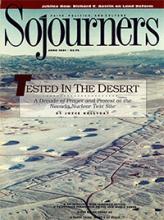The past few months have given us a vivid reminder of the power of violence -- the power to destroy, the power to kill. The Persian Gulf war and its chaotic aftermath stand as a graphic argument for nonviolence and diplomacy, as we see more and more evidence that violence is incapable of solving human problems, especially the cataclysmic violence of modern warfare.
The Gulf war was not, as some have asserted, an example of the failure of nonviolence. Rather, as has so often been the case in human history, nonviolence was abandoned before given a real chance. One reason people are so quick to forsake nonviolence is simply ignorance.
Activist and Jesuit priest John Dear goes a long way to dispel that ignorance in his book Our God is Nonviolent, an introduction to the theory and practice of nonviolence. While not breaking new ground, Dear provides an excellent overview of the theology of nonviolence in a compelling and readable manner. He draws on some of the best theoreticians and practitioners of nonviolence, from historical heroes to contemporary interpreters.
The emphasis throughout is on the theology of nonviolence, and not just its politics or practice. Nonviolence, Dear explains, can never be reduced to tactics only. True nonviolence requires a revolution of the heart, a conversion. The author rightly grounds such an inner, spiritual experience where it belongs: in the life, teachings, and -- most important -- the Spirit of Jesus.
DEAR'S PRIME theological insight is reflected in the book title, and is based on a simple but profound truth. Jesus, God's son, not only teaches us how to behave as humans, but more important is the clearest expression of who God is. Jesus' way of nonviolence is an ethic for his followers. As the personification of God, Jesus also stands as a lived revelation of God's very nature.
Read the Full Article
